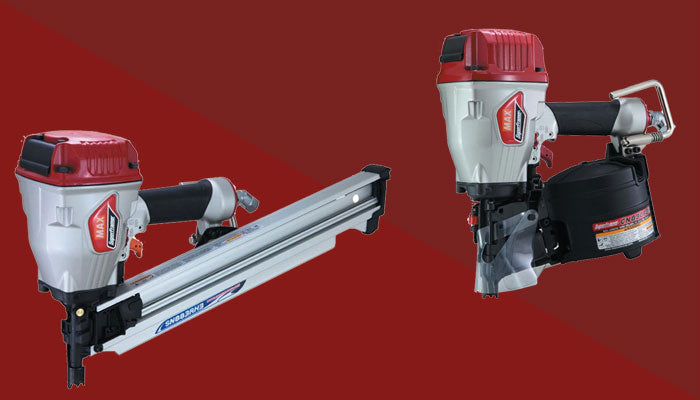
Coil Vs. Strip Nailers
Comparison: Coil Vs. Strip Nailers
Which is better between a coil framing nailer and a strip nailer? The answer to this one will stir a debate amongst many. Large scale carpentry work usually requires hundred if not thousands of nails. With jobs that big, a hammer is just not the best tool. Ether a coil framing nailer or strip nailer would be a better fit. So, which is better? Let’s check them both out and let you be the judge.
Coil Framing Nailer Vs. Strip Nailer
Both types of nailers are frequently seen at job sites and are commonly used for framing. Even though coil nailers may not be used as often as strip nailers for framing, they are still a very versatile and popular tool. Check out our assortment of framing nailers.
Coil Nailer Basics
Depending on the type and size of nail, Coil nailers usually hold 200~300 nails in their canister. The two most common types of nails used are framing or sheathing nails. With a higher load capacity, there is less need to reload which is a definite time saver.
Coil nailers are typically compact, meaning using them in tight spaces isn’t an issue. But even with the ability to maneuver most situations, the biggest complaint tends to be the weight. A fully loaded canister can increase the weight of the tool significantly and create fatigue more quickly. As a result, a strip nailer is more commonly used for overhead work since it is lighter.
Strip Nailer Basics
A strip nailer has high compatibility when it comes to nails. With this comes a responsibility for users to make sure that the nail has the correct angle and collation style to fit the nailer.
A strip nailer consists of two magazines that hold 25~40 nails each. Obviously, that is less than a coil nailer. However, there is less fatigue due to its lower weight. The typical strip nailer will be able to hold the following nail types:
- Plastic collated round head nails between 17 degrees ~ 18 degrees
- Plastic collated round head nails between 20 degrees ~ 22 degrees
- Wire collated D-head nails between 27 degrees ~ 28 degrees
- Paper collated D-head or offset head nails between 30 degrees ~ 34 degrees
ToolBarn Tip: You will need to follow local rules and codes which may potentially rule out the usage of certain nail types. As a result, it is essential to pay attention to the acceptable nail types when you’re making your purchase.
Key Comparisons
- Weight- A fully loaded coil nailer can easily weigh 10 pounds or more. As a result, having to hold one of these overhead for a long time can cause fatigue. Strip nailers weigh much less due to their smaller magazine capacity, resulting is less chance of fatigue.
- Capacity- If you’re working on something that requires a lot of nails, a coil nailer would fit better for your job due to its large loading capacity. Stopping to reload every 50 nails is not efficient.
- Loading- Coil nailers use round canisters with a loop design that allows for rapid firing and minimizes jams. Strip nailers on the other hand use magazines with nail strips that makes the tool longer in comparison.
- Nail pricing- Nails for strip nailers are oftentimes far more expensive than that of coil nailers. Coil nailers aren’t that dependent on certain angle nails, so they’re easier and cheaper to fill.
- Jamming- The magazine design of a strip nailer makes it more prone to jamming compared to coil nailers.
So, which is better? Coil? Strip? There’s no right or wrong answer. It really depends on the job. Nonetheless, we recommend a coil nailer if the working area is small and there is less space to operate due to the tool’s compactness and maneuverability.
However, if you have a pouch with you, strip nailers may be the better option since they’re easier to reload. Make sure you bring enough nails with you for the job to save a lot of time. Nevertheless, coil nailers would still be able to save you more time since they’re less likely to jam.


